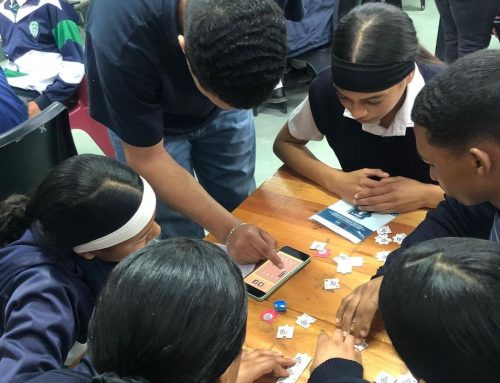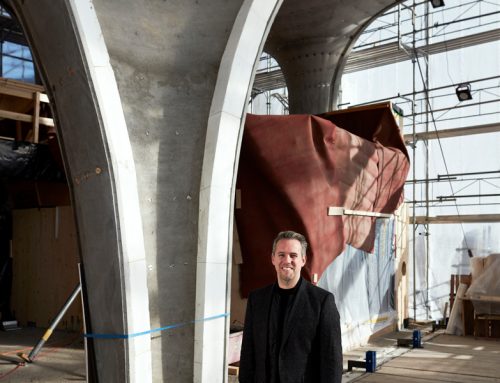Professor Lewis Gordon is amused that in South Africa he is sometimes confused with the human polar bear, Lewis Gordon Pugh.
“When people meet me they are even more confused because I’m definitely not white or swimming in the snow,” says Prof Gordon from his office in the Department of Politics & International Studies at Rhodes University, where he has was the Nelson Mandela Visiting Professorship for 2014/2015.
A leading global academic in philosophy, politics, Afro-Judaic studies, Africana studies and the study of race and social thought, he is based at the Philosophy Department and the Africana Studies Institute at the University of Connecticut in the United States.
He commutes between here, South Africa and Europe, where he is the European Union Chair in Philosophy and a visiting professor in the Department of Philosophy at the University of Toulouse in France.
Describing himself as “a meeting of many worlds”, Prof Gordon draws on his own multiculturalism to encourage people worldwide to recognise the meeting of many worlds within us all, and to draw on this as a source of activism for a more humane world.
“I was born in Jamaica to an Afro-Chinese-Jamaican father and a Jamaican Jewish mother. They were childhood sweethearts and I am the consequence of this. They were just 19 when I was born,” he explains.
“My father’s family originally came to Jamaica from Africa as slaves. My mother came from a family of Sephardic and Palestinian Jews who immigrated to Jamaica in the 19th century from Ireland and Palestine to participate in the burgeoning coconut processing industry and other opportunities there.”
The Sephardic Jews are a distinct Judaic group that settled in Spain and Portugal during the period of Afro-Arabic control of Iberia.
Prof Gordon left Jamaica as a young boy and moved to New York with his mother and two brothers to find a better life.
“We lived in the Bronx in poor but very happy conditions, and my mother, who passed away in 2004, was one of the most courageous, resourceful people I know,” he says.
His father died that same year in an accident.
“It took us several years to find out what had happened to him. He’d lived a hard life; he grew up on the streets of Jamaica, and had to find ways to look after himself and his brothers. He used his wit and good looks to achieve this, and he certainly charmed my mother,” says Prof Gordon.
He, in turn, fell in love with and married Professor Jane Anna Gordon, a world-renowned academic of South African parents. She teaches in the Political Science Department and the Africana Studies Institute at the University of Connecticut.
“Jane’s mother, Jean Comaroff, is from Port Elizabeth and her father, John Comaroff, is from Cape Town. Both are of Ashkenazi or European Jewish descent. I’m thus also connected to South African through marriage and our family, which includes our four children. We, in turn, practise our own form of Creolised Nazarene Judaism,” says Prof Gordon.
“It’s a combination of our combined Jewish ancestry (Ashkenazi, Sephardi, and Mizrahi) and the original, ethical foundation of Judaism, which is all about taking responsibility for the ethical face of God on Earth.”
The reason he elaborates on various Judaic groups is because “just as people have a very narrow understanding of race and origin, so they have a very narrow understanding of religions”.
Drawing on Judaism as an example, he illustrates that it is an extremely diverse religion with many different philosophical approaches.
“A very important part of this, and something that I pursue as an academic when I am teaching about Judaism, is to debate critically what it is. Judaism was always intended as a religion of debate where students would discuss and argue this. It was never intended to be dictatorial,” Prof Gordon elaborates.
Dictatorial religious, cultural and political doctrines of any kind, he adds, underlie the world’s history of violence, poverty, intolerance, enslavement, colonialism and human rights abuse.
“The opposite happens when you open yourself up and study life and try to see the relationship that everything has to everything else, and the relationship that everyone has to everyone else,” he says.
This is reflected in the title of his Thinking Africa public lecture as the Nelson Mandela Visiting Professor at Rhodes in October 2014: When did and do we meet? A philosophical anthropology of time: Euro-modern, Afro-modern and beyond.
“It’s all about re-thinking the distortions we have created around the philosophy of what it is to be human,” he explains.
“As part of this, I believe that modern philosophy and epistemology or the theory of knowledge, as practised in many universities, misrepresent human history.”
According to this misrepresentation, 17th century French philosopher and mathematician René Descartes’ statement “I think; therefore I am” becomes a fulcrum of human thinking and self-understanding.
This, Prof Gordon explains, serves to reinforce predominantly racist notions that the so-called “primitive human” had no concept of what it means to be human; that we all had to wait for European thinkers like Descartes to come along to start exploring this.
“What this is, is a deliberate fiction of the Euro-modern world during the transition to European global colonialism,” he says.
What this did was to create an ideological dichotomy between “modern” or “developed” people, who are generally perceived as white, and “primitive” or “undeveloped” people, who are generally perceived as dark or black.
“Certain theorists today point out that these are prejudicial, racist impositions on a wide range of communities and human beings who, in fact, have a far richer understanding of what it means to be human than many so-called developed people,” Prof Gordon explains.
“It goes further. Implicit in this racist appeal to primitivism is the thesis that the so-called undeveloped people belong in the past. This is a fallacy as many of these people are not only very much in the present, they also address the contradictions of the present and are far more attuned to the conditions required for a sustainable future for all.”
Such a future, he continues, requires an entirely different model to the current corporate capital model, which was conceived to serve the global north, and which is deeply flawed. Symptoms of this are the global financial crash of 2008 and the mounting planetary crisis.
“At all levels – from economists to scientists to artists – we are seeing a crisis in decision-making about where we are going. For me, this is extremely exciting; it’s the perfect opportunity for human beings to re-think who we are and what is important,” he continues.
“With eight billion people on the planet today, combined with the rapid movement of knowledge and ability to communicate across the globe in an instant, if only 3% of the eight billion are extraordinarily talented people with great insight, that is still a lot of talent and insight coming together to recreate a new model for humanity.”
Prof Gordon explains this is a model beyond presidents and kings. “The time has long gone to look to presidents and kings as if they were gods. All leaders, even the greatest, like Nelson Mandela, are human beings. If we insist on reaching out to them as if they were gods, we will only be disappointed when what we receive back is a human being.”
This realisation, he continues, places the power of change in each one of our hands.
“We are all part of one global community and therefore Syria or Nigeria or Israel or Palestine or South Africa’s problems are everyone’s problems, and we must all try to understand the many cultures and groupings that are part of all societies in order to develop a more thorough understanding of each other,” he emphasises.
“We need to do the same at universities. We need to cultivate more informed, cross-cultural human relationships to build the intellectual, artistic and scientific project.
“We need to ask the question, ‘I think, therefore I am what?’ We need young people at university to claim their adulthood instead of what we all too often see – grown people behaving like adolescents and continuing to do so into middle age.
“I am heartened to be able to say that the students I have met at Rhodes over the years, stand among the very best of the various cohorts I have taught at many universities. I appreciate not only their intelligence and wit but also their humanity and their ethical spirit.
“We need people like these, and indeed all people, to seek solutions to the problems we face, because at the heart of all our problems, whether they are political, social, economic, environmental or anything else, are human beings, and it is up to us as human beings to solve human problems, humanely.”
Bringing world-renowned scholars to Rhodes
The Nelson Mandela Visiting Professorship was launched in 2012 with a view to bringing world-renowned scholars to Rhodes University to teach postgraduate courses and give seminars and public lectures.
In welcoming Professor Gordon to Rhodes, the Dean of Humanities, Professor Fred Hendricks said: “Lewis is a distinguished leftist scholar and is very well known for his work on universities, race, justice and all the issues that are confronting us. He has made a major contribution to these issues globally.”
On taking up the Nelson Mandela Visiting Professorship, Prof Gordon said: “As I see it, this is a national professorship since its namesake embodies the spirit of the nation, its aspirations and its character. That Mandela cannot—indeed, could not—be everything for the nation is a reminder of there being much to do, much to learn, much to figure out.
“That is one of the principles of research and scholarship, and with the name of such an historic public figure behind it, is also a reminder of the value of knowledge for the public good, and the important meeting of knowledge and courage in the form of action. It reminds us of the importance of public commitment and what it means to attempt to make human institutions humane. This includes inquiries into questions of justice and the associated struggles.
“I have been meditating on problems of ‘unjust justice’, of what it means when systems of justice go wrong. I have been working on these ideas, with special attention to the intellectual offerings from what is known these days as the Global South, for my next book No Longer Enslaved Yet Not Quite Free.
“This project benefited much from my spirited engagements on African humanism and ubuntu at Rhodes last year. I would like to explore these contradictions along with the ongoing concerns of what it means to be human, what it means to be free, and what it means to offer critical reflection on such matters, especially in the realm of political thought in terms of 21st century global challenges.”




